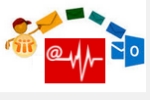Last week Sir Cary Cooper, Professor of organisational psychology and health at Lancaster University hit the news by saying that the UK’s compulsion to deal with messages has caused us to become less productive than many of our international counterparts. Of course there are many other factors effecting productivity levels but it does play a part. It caused a wry smile in our office. My team are always hearing me say “pick up the phone!” Often it’s much quicker and productive of good understanding than batting emails back and forth. People want to deal with people not robotic emails. Emails are fine for confirming advice, but not for the initial getting to the root of the problem.

Professor Cooper suggests that something like a quarter of people are checking their emails on holiday and almost everybody is checking their emails at home at night, long after they’ve ‘left’ work. This causes health and family problems.
Employees can access their work emails from multiple devices from the moment they get up in the morning to the minute they go to bed. It is no longer a rarity to receive an email in the early hours of the morning from a work colleague or even a client.
The UK has developed a culture where employees want to be seen to be available by email at all hours of the day. Our “open all hours” culture prevents employees from a decent night’s sleep, not to mention the further complications that come from stimulants like coffee, energy drinks, alarm clocks, and signals emitted from electronic devices which interfere with your circadian rhythm or natural sleep/wake cycle.
There’s something about email that seems to drive a sense of urgency, but in most cases it’s an inaccurate perception. Professor Cooper suggested one way to tackle the compulsion was to ban emails sent and received within the same building.
Many organisations have tried different ways to get their staff talking instead of using the conventional email systems. A notable system of this sort is Microsoft’s Yammer. Unfortunately these systems still caused the same problems.
French IT giant Atos believes that if social media tools are used properly they can solve many of emails problems if used properly. In 2011 Atos revealed that it would be banning the use of internal emails. This is part of a company aim to end the use of email altogether. There reasoning for the change was Atos employees would go away on holiday and had hundreds of emails in their inbox which they were expected to sort through whilst getting back up to speed with their job. Atos now claims that their new system makes it clear that you don’t have to catch up with emails anymore because social communication needs are very different to those of an email application.
Atos’s change has caused question as much of their revenue comes from providing email services to others. But Atos say they’re going to stick with their new policy, though it will need training and a cultural shift within the business.
Allowing employees to spend every waking moment on their devices is not good for their efficiency or mental and physical wellbeing. I don’t approve of the prevailing cult of busy-ness. It’s a 2015 version of the White Rabbit’s “I’m late, I’m late! For a very important date!” on his way to the Queen’s Croquet Party; busy-ness is often an inaccurate perception but no less damaging to health (and business come to that). Everyone needs a rest.
All very well to say that. What about some practical guidance. You have to be ruthless with emails but gracious with people and there are plenty of tips online. For what they’re worth here are my thoughts on grappling with the email octopus.
- The usual rules for dealing with paper apply. On arrival, delete it, file it or action it. Make sure you unsubscribe from all the garbage that flies around.
- Use clear subjects in the header and write your response briefly and to the point. I hate padded answers.
- Only send essential emails. The less email you send the less you’ll get. Nobody ever died from not getting email about something unnecessary.
- Don’t copy the world and his wife every time you send something.
- If you’re fact finding talk to other parties by phone or face to face. It’s much faster and avoids misunderstandings.
- Work in focused blocks of time. Dealing with emails for 10-15 minutes every two hours is far more efficient than dropping everything every time an email arrives. You don’t have to deal with emails the second they arrive. Frankly if it’s urgent people will phone. If your boiler bursts do you phone your plumber or email him/ her? QED.
- Once a week do 15 minutes housekeeping to clear your inbox and archive/ delete items you don’t need every 12 months.
Russell HR Consulting provides expert knowledge in HR solutions, employment law training and HR tools and resources to businesses across the UK.
Subscribe to our free monthly HR newsletter. Russell HR Consulting employment law newsletters are emailed automatically to our ever-growing number of subscribers every month.
Latest blog posts
- Is There a Santa Clause?
06 / 12 / 2023
- Lend Us a Hand!
22 / 11 / 2023
- What Happens When There is a Clash in Protected Characteristics?
17 / 10 / 2023
- Encouraging a Healthy Workforce 2
21 / 09 / 2023
- Encouraging a Healthy Workforce
23 / 08 / 2023
- What a Disaster - (But We Have a Cunning Plan!)
20 / 07 / 2023
- It’s Time We Stiffened the Sinews
14 / 06 / 2023
- Why Is It So Important to Develop Emotional Resilience?
16 / 05 / 2023
- When is a discretionary bonus not discretionary?
20 / 04 / 2023
- Recovering Training Costs 15 / 03 / 2023
